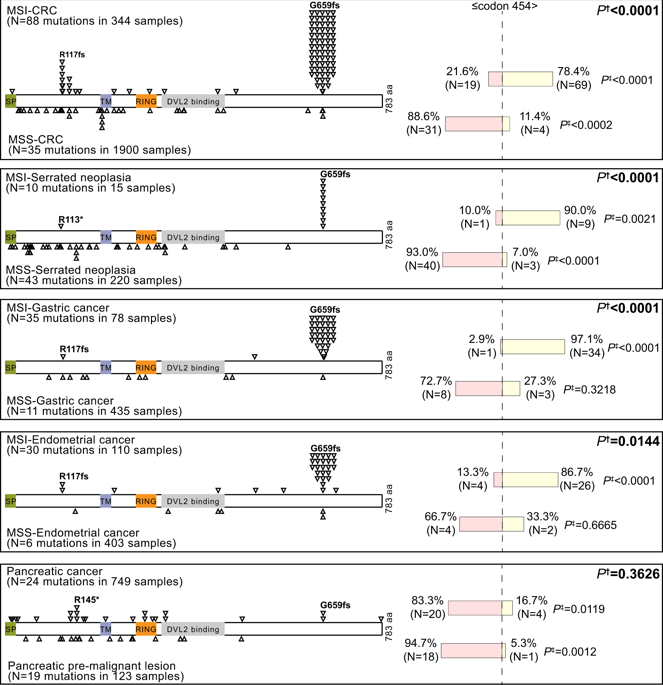Oncogene ( IF 6.9 ) Pub Date : 2020-02-26 , DOI: 10.1038/s41388-020-1232-5 Shan Li 1, 2 , Marla Lavrijsen 1 , Aron Bakker 1 , Marcin Magierowski 1, 3 , Katarzyna Magierowska 1, 3 , Pengyu Liu 1 , Wenhui Wang 1, 4 , Maikel P Peppelenbosch 1 , Ron Smits 1

|
Cancer-associated RNF43 mutations lead to activation of β-catenin signaling through aberrantly increasing Wnt-receptor levels at the membrane. Importantly, inactivating RNF43 mutations have been suggested to render cancer cells sensitive to Wnt-based therapeutics. However, the extent to which RNF43 mutations lead to impaired regulation of Wnt/β-catenin signaling has been poorly investigated. Here, we observed that tumors with a functional mismatch repair system show a predominant 5′-location of truncating RNF43 mutations, suggesting C-terminal truncations such as the most commonly reported p.G659fs mutation, do not affect β-catenin signaling. In accordance, expressing C-terminal truncation mutants and wild-type RNF43, showed equal effects on β-catenin signaling, Wnt-receptor turnover, and DVL-binding. We confirmed these observations at endogenous levels by CRISPR-Cas9-mediated knockout of G659fs RNF43 expression in KM12 cells and generating comparable mutations in HEK293T cells. We could not confirm previous reports linking RNF43 to p53 and E-cadherin breakdown. Our data also suggest that only colorectal cancer cells harboring N-terminal mutations of RNF43 convey Wnt-dependency onto the tumor cells. Results of this study have potentially important clinical implications indicating that Wnt-based therapeutics should be applied cautiously in cancer patients harboring RNF43 mutations.
中文翻译:

常见的 RNF43 突变保留了减弱 Wnt/β-catenin 信号传导的功能,并且不太可能将 Wnt 依赖性赋予结肠直肠癌
癌症相关的RNF43突变通过异常增加膜上的 Wnt 受体水平导致 β-连环蛋白信号传导的激活。重要的是,已经提出灭活RNF43突变可以使癌细胞对基于 Wnt 的疗法敏感。然而,对RNF43突变导致 Wnt/β-catenin 信号调节受损的程度的研究很少。在这里,我们观察到具有功能错配修复系统的肿瘤显示截断RNF43的主要 5' 位置突变,表明 C 末端截断,例如最常见的 p.G659fs 突变,不影响 β-连环蛋白信号传导。相应地,表达 C 末端截短突变体和野生型 RNF43 对 β-连环蛋白信号传导、Wnt 受体转换和 DVL 结合具有相同的影响。我们通过 CRISPR-Cas9 介导的敲除 KM12 细胞中的 G659fs RNF43 表达并在 HEK293T 细胞中产生类似的突变,在内源性水平证实了这些观察结果。我们无法证实先前将 RNF43 与 p53 和 E-钙粘蛋白分解联系起来的报道。我们的数据还表明,只有结直肠癌细胞具有RNF43的 N 末端突变。将 Wnt 依赖性传递到肿瘤细胞上。这项研究的结果具有潜在的重要临床意义,表明基于 Wnt 的疗法应谨慎应用于携带RNF43突变的癌症患者。











































 京公网安备 11010802027423号
京公网安备 11010802027423号